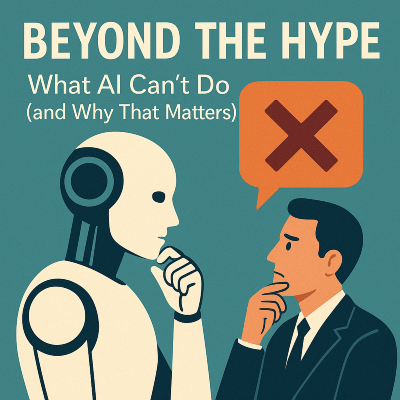Artificial intelligence (AI) is everywhere. From news headlines to boardroom conversations, it’s often portrayed as a revolutionary force that will transform everything — even surpass human intelligence.
But is AI really as powerful as the hype suggests? The truth is more nuanced. While AI can process massive amounts of data and automate tasks faster than any human, it cannot think, feel, or lead like we do.
This article debunks common AI myths, explains the difference between human and artificial intelligence, and offers a practical breakdown of what AI can and cannot do for your business.
Common Misconceptions About Artificial Intelligence
Despite the buzz, several myths about AI still circulate:
- AI is smarter than humans
- AI can think and understand like people
- AI will replace most human jobs
The reality? Humans and AI are not competitors. Humans bring reasoning, judgment, creativity, and empathy — qualities AI does not possess. What AI does best is process data at lightning speed, spot patterns, and perform repetitive tasks at scale.
Instead of seeing AI as a rival, think of it as a business assistant: it can extend your capacity to solve problems, but it will never replace the human mind.
Human Intelligence vs. Artificial Intelligence: The Key Differences
Here’s the main distinction:
- Human intelligence allows us to imagine, innovate, adapt to ambiguity, and make decisions guided by values and ethics.
- Artificial intelligence excels at speed, efficiency, and scale, but it lacks comprehension, intuition, and true creativity.
That’s why the most successful businesses don’t pit AI against people — they combine the strengths of both.
What AI Can and Cannot Do for Your Business
So what does this mean in practice? Here’s a side-by-side breakdown of AI capabilities vs. limitations:
| WHAT AI CAN DO | WHAT AI CANNOT DO |
| Automate Routine Tasks Data entry, invoice processing, scheduling, email filtering, document classification | Make Strategic Business Decisions Alone AI provides data, but not vision or judgment. It cannot weigh ethics, values, or long-term goals. |
| Analyze Large Datasets Spot trends in sales, finance, or customer behavior; predictive analytics (sales, demand, churn) | Think Creatively or Innovate from Scratch AI can remix ideas, but it doesn’t truly invent or imagine like humans. |
| Enhance Customer Service Chatbots and virtual assistants for FAQs, order tracking; 24/7 support at scale | Understand Human Nuance or Emotion AI struggles with tone, sarcasm, cultural context, and lacks emotional intelligence in leadership or HR. |
| Support Decision-Making Dashboards, risk assessments, pricing optimization, market segmentation | Adapt Well to Ambiguity AI depends on clear, structured input; it produces weak results when data is missing or unclear. |
| Personalize Marketing Targeted ads, product recommendations, A/B testing, customer journey tracking | Ensure Ethical or Fair Use AI cannot evaluate moral dilemmas and may reinforce bias without human oversight. |
| Detect Fraud or Anomalies Spot unusual transactions in finance, trigger real-time cybersecurity alerts | Replace Human Relationship Building Networking, mentorship, trust, and empathy remain uniquely human skills. |
| Improve Supply Chain Efficiency Predict inventory, optimize routes, track vendor performance | Take Full Accountability AI may recommend, but humans remain responsible for business outcomes. |
| Accelerate Content Generation Generate reports, captions, product descriptions, and translations | — |
Why AI Is a Tool, Not a Replacement
AI is not here to take over. It’s a powerful business tool that helps companies automate tasks, analyze data, predict trends, and improve customer experiences.
But the qualities that truly drive business success — creativity, ethics, leadership, emotional intelligence, and vision — remain uniquely human.
| The companies that win won’t be those that fear AI or blindly adopt it, but those that learn to combine AI’s efficiency with human creativity, judgment, and leadership. What do you think: is AI more of a business threat or a business opportunity? Share your thoughts in the comments. |
